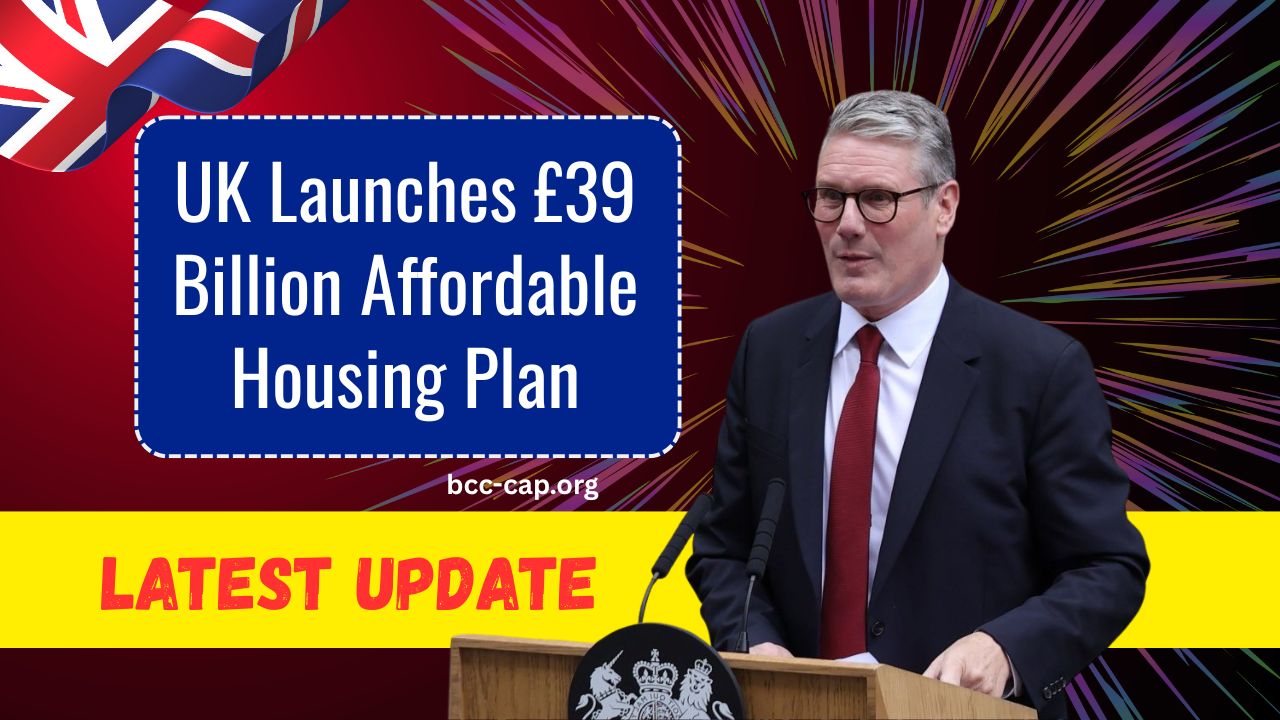The UK government has officially launched a groundbreaking £39 billion housing initiative aimed at tackling one of the country’s most pressing issues—affordable housing.
As homelessness and rent inflation reach record highs, this new plan is set to deliver 300,000 new homes by 2035, focusing on long-term, low-cost housing for those most in need.
This article breaks down who qualifies, how to apply, and the impact this new housing scheme will have on millions of lives.
What Is the £39 Billion Housing Programme?
Part of the UK’s broader Plan for Change, the £39 billion Affordable Homes Programme is the largest investment in social housing in decades.
Managed by Homes England and the Greater London Authority (GLA), the initiative aims to provide safe, modern, and energy-efficient homes for low-income households, families in temporary accommodation, and first-time renters.
Programme Overview
| Feature | Details |
|---|---|
| Total Budget | £39 billion |
| Timeline | 2025 to 2035 |
| Homes Planned | 300,000 |
| Social Rent Allocation | At least 60% (approx. 180,000 homes) |
| Key Agencies | Homes England, Greater London Authority |
| New Standards | Decent Homes & Energy Efficiency Standards |
What Makes This Scheme Different?
The programme isn’t just about quantity—it’s about quality and long-term impact. These homes will adhere to stricter construction standards that improve energy efficiency, reduce utility bills, and provide stable living conditions.
Key highlights include:
- Affordable Rent: 60% of homes will be offered at social rent, adjusted based on local incomes.
- Energy Efficiency: All units must meet new energy-saving standards, reducing carbon emissions and household costs.
- Decent Homes Standard: Modern safety and quality standards ensure residents live in safe, well-maintained environments.
Who Will Benefit Most?
The programme specifically targets those hit hardest by the UK housing crisis:
- Families in temporary accommodation
- Low-income earners unable to afford private rent
- Young people and first-time renters
- Current council tenants in poor or overcrowded housing
These groups will have access to long-term, stable housing options that were previously unaffordable or unavailable.
How to Apply for Housing Under This Scheme
Applications for homes under this scheme are not made directly to the UK government. Instead, housing will be distributed through local authorities and housing associations.
Steps to Apply:
- Register with your local council for social housing.
- Apply through housing associations involved in the new housing development.
- Stay updated on public notices for new housing projects and local eligibility guidelines.
To qualify, applicants must typically:
- Be on a low income
- Live in inadequate or temporary housing
- Have a local connection to the area
Major Reforms Supporting the Housing Plan
The programme is reinforced by several new policies designed to enhance effectiveness:
- Right to Buy Limitations: Prevent rapid depletion of public housing stock.
- Rent Cap Consultations: Designed to curb private rent increases.
- Energy Reforms: All new homes must meet environmental performance targets.
- 10-Year Rental Agreements: Provide stability for housing developers and tenants.
Approximately £11.7 billion of the funding will be allocated to the Greater London Authority, where housing shortages are most acute.
The £39 billion UK housing programme marks a bold step toward solving the nation’s deepening housing crisis. With 300,000 new homes planned, this initiative will directly benefit families, low-income individuals, and first-time renters across the country.
Backed by strong policies and sustainability goals, the programme promises a safer, greener, and more affordable future for millions.
If you think you may qualify, now is the time to register with your local council or housing association—don’t wait until it’s too late.
FAQs
What is the UK’s new £39 billion housing programme?
It’s a government-led plan to build 300,000 affordable homes by 2035, with a focus on social rent housing.
Who can apply for homes in this scheme?
Low-income families, those in temporary housing, and first-time renters can apply through local councils or housing associations.
How are the new homes different?
They will meet Decent Homes Standards and energy efficiency requirements, offering safer and more cost-effective living.

